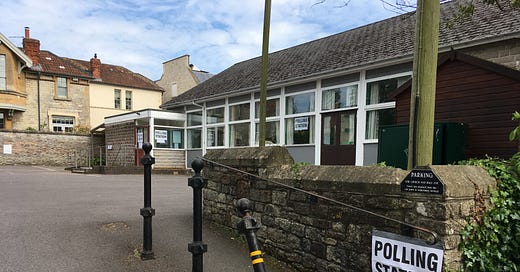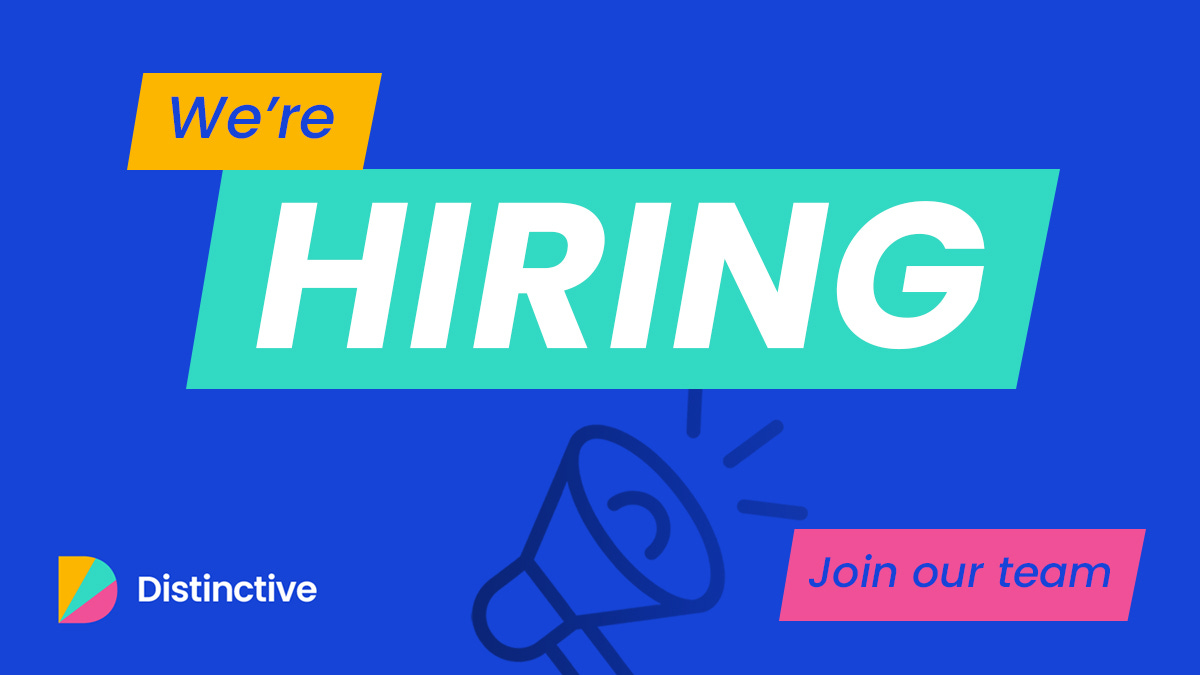Distinctive Dispatch #14: Change is afoot - what it means for business
First thoughts, post-election; engagement success in Somerset; clarity in a crisis; writing a winning award entry; join the Distinctive crew.
Better comms for people, places and work
Thanks for supporting this newsletter. I send this bleary eyed, having followed the local election results as they started to come in this morning. Please forgive any rawness in the ramblings below. If you have thoughts, or suggestions on what you’d like us to cover in future, let us know in the comments or get in touch.
Change awaits (again): are we ready for it?
As this newsletter lands, work to determine the political make-up of more than 100 local councils and 10 combined authorities continues.
Having written about, reported on, and followed local elections for more than two decades, it’s easy at these times to resort to hackneyed phrases around things like outcomes ‘hanging in the balance’.
While there are some tense local contests, including in Bristol where the Green Party stands a chance of taking control of the city council from Labour, such terms seem wide of the mark this morning.
Many others will provide sharper or more detailed analysis than I’m capable of right now. Although it’s a relatively small round of local elections, it will be interesting to see their thoughts on what these results mean for the general election later this year.
I’ll stick my neck out and say these results spell bad news for the Conservatives. With around a third of council results declared, the party is on course to lose hundreds of councillors and campaign foot soliders. You don’t need pie charts to know that this is a grim outcome for a party gearing up for a national election campaign that’s trailed consistently in opinion polls for the best part of two years.
While suggestions of low voter turn-out shouldn’t encourage Labour either, it seems that people have stopped listening to the Conservatives’ key messages. News of Labour’s win in the Blackpool South by-election and growing support for the party in Scotland amidst Scottish National Party struggles further lays the path to electoral success for them.
These signals point to a big win for Labour in the general election. Locally and nationally, businesses need to get ready for change.
What change means locally
From next week, Bristol City Council starts a new era of committee-led governance. We’ll find out today whether Labour, the Greens, or neither party has overall control. The council appoints new leaders and committee chairs on 21 May, ending the city’s elected mayoral model which voters supported before 2012 and then abolished a decade later.
Whoever leads the council, and we wish them well, challenges facing the city remain stubbornly in place. Housing is more expensive than ever, to rent or buy. Terrible public transport and congestion remains a big concern for businesses. Inequality leaves increasing numbers of people unable to share in the city’s economic success. Funding shortages for local authorities make addressing these challenges harder still. There is no getting away from this.
Gloucester also faces a change after its leader Cllr Richard Cook (Conservative) recently announced his intention to step down. His party, which has a two-seat majority, progressed the £200m transformation of the city centre through the headwinds of the pandemic and economic turbulence. The next leader inherits a golden opportunity to set the city centre up for long-term success. Results are expected from 5pm today (Friday, 3 May).
In Stroud, the Greens hope to consolidate the party’s leading position ahead of the Conservative opposition on the district council. With several long-standing councillors stepping down, the Conservative group has encouraged voters to focus on local issues. The count for Stroud District Council takes place tomorrow (Saturday, 4 May).
Election results in Plymouth and Exeter landed early this morning, with Labour maintaining control of both councils. The Conservatives have just seven seats in Plymouth having lost councillors overnight.
Responding to change
Early results add weight to what’s been obvious for a while: political change is coming.
Whatever their size or sector, businesses can act now to ensure key stakeholders, including new councillors, know what they stand for.
Understanding local policies around key areas – homes, skills, jobs – will help them connect with local leaders’ delivery ambitions. How can they work together to help each other?
Highlighting their work’s positive economic and social contribution can play a crucial part in shaping opportunities for future investment.
And, in increasingly fractious times, being part of the conversation about a town or city’s future is a better place to be than on the sidelines. On that note…
Change for good?
Before finishing, I’ll return to a hope I’ve shared before about how we engage each other on important matters that affect all of us.
The election campaigns were hard fought, and occasionally nasty. Online discourse in Bristol has been particularly unpleasant, amplified in parts by a small group who seem to criticise some candidates' every step. There have been times where this has moved beyond strident criticism towards slander and intimidation.
I know good people who won’t engage in discussions for fear of being caught in a pile-on. This is how echo chambers happen. It’s not healthy, or conducive to the ‘collaboration’ that many people say they want to see. Responsibility for changing this rests with all of us.
Although it will be hard, the local election presents an opportunity for Bristol to move beyond binary thinking towards a more open, inclusive conversation.
That means being honest and transparent about mistakes. It means two-way communication, without attacking those who hold a different view. And it means giving a bit and looking for solutions to big problems together.
As a collaborative, purposeful team, we look forward to working with clients and local leaders to advance their shared ambitions.
Massive thanks to those who give their time to serve their communities. And well done to local journalists who continue to cover the results today.
If you’d like to know more about what’s happening in the areas outlined above, or how we could help you, drop me a line.
How human comms can tackle policy gridlock
Local councils face massive challenges when trying to implement change if they don’t involve communities properly in the process.
As we’ve mentioned before, recent efforts to implement Low Traffic Neighbourhoods show that well intentioned measures can become embroiled in controversy.
So we were delighted to support a six-week consultation on Mendip Hills National Landscape’s proposals for a temporary road closure in Cheddar Gorge recently. The proposals had the potential to spark a backlash, and the consultation generated more than 1,700 responses. But most people who responded said they supported the measures. Many stated they would like to see the proposals go further.
The supportive media coverage felt a world away from the fevered national rhetoric that accompanies such measures. And it was particularly pleasing to see the Consultation Institute highlight our work as an example of good practice.
Congratulations to all involved in this process. You’re leading the way in providing space for genuine conversation about change.
Drop us a line if you’d like to know more.
Things we’ve seen
British Army response to incident with Household Cavalry Mounted Regiment horses: This response to an incident which upset Royal horses was a fine example of how communications can address a crisis. It’s clear, timely and addresses the issue directly. Posted across social media on the day of the incident, it helped put events into perspective in a way that holding the line or ‘no comment’ could never achieve.
Seen by Ben Lowndes
Things we’ve read
Interview with David Rudlin, Director of Urban Design and BDP: In this interview with Design West, David discusses the role of an urban designer, priorities for improving cities of the future, the importance of design codes, and changing the reputation of high density living. It also shares insights into Bristol’s approach to housing, what designers can learn from Manchester, and elements of well-planned neighbourhoods.
Read by Arianne Smart
Reporters banned from rewriting press releases: Local news publisher National World is apparently banning its journalists writing up press releases, to allow them to focus on original content. In some respects, for those who worked in newsrooms when releases arrived by fax, this has a familiar ring. A modern twist is that PRs can pay to upload content directly to National World websites, in a move designed to end the ‘industrialised approach to churning releases.’
What does this mean for local news? Well, it’s a tough time for publishers and they need to diversify their income streams. But it certainly raises questions about transparency and editorial control over what's appearing in National World titles. And for PR professionals, passing off paid-for coverage as ‘earned’ is poor form. It’s not something we would ever do. We watch this move with interest.
Read by Arianne Smart
AI isn't useless. But is it worth it?: Molly White makes some great points on Large Language Models like ChatGPT, about the hype, its limitations, and the idea that it's most useful when doing stuff that we probably could do less of anyway. The table with outputs responding to prompts to write content in the style of the author is brilliant, if a depressing window into where some organisations could be heading.
A timely reality check, that chimes with my experience of using these tools regularly.
Read by Ben Lowndes
Things we’ve heard
Ian Hislop on Boris Johnson, Piers Morgan and political satire in the age of the absurd - The News Agents Podcast: Hislop skewers Westminster nonsense presenting old Etonians and city traders as ‘outsiders’ and speaks of Daily Mirror reporters harassing him at the height of Piers Morgan’s editorship. He’s got years on them all and shows no sign of bowing out after the next election. Politicians aspiring for high office won’t look forward to having him on their case.
Things we’ve said
How to craft a winning award entry: With awards season in full swing, teams have the opportunity to see their work recognised amongst the best in their sector. Arianne’s blog highlights key points to consider if you want to take home the top prize, from picking the best opportunities to telling your story well and following the right steps. Congratulations and good luck to all entrants. And we’re delighted to see our clients’ names up in lights.
Distinctive design to support local culture: Our team creates stand-out design to make local art exhibitions shine. We love working with local cultural spaces to promote their events. Our recent work with Victoria Art Gallery included designing the marketing materials for their Dreams Confront Reality: Surrealism in Britain exhibition. Whilst important to spotlight the work on show, our approach worked across different advertising formats, with a keen eye on timelines and deadlines at all stages.
We’re hiring!
Join the Distinctive Crew! We’re delighted to be hiring again, having started the search for our next content writer. If you know someone who would be a great fit for the role, this post explains the position and how to apply. We’re accepting applications until the end of May.
We’ll see you again in early June. Thanks for taking the time to read this. If you want to discuss anything, please leave a comment or drop us a line.





